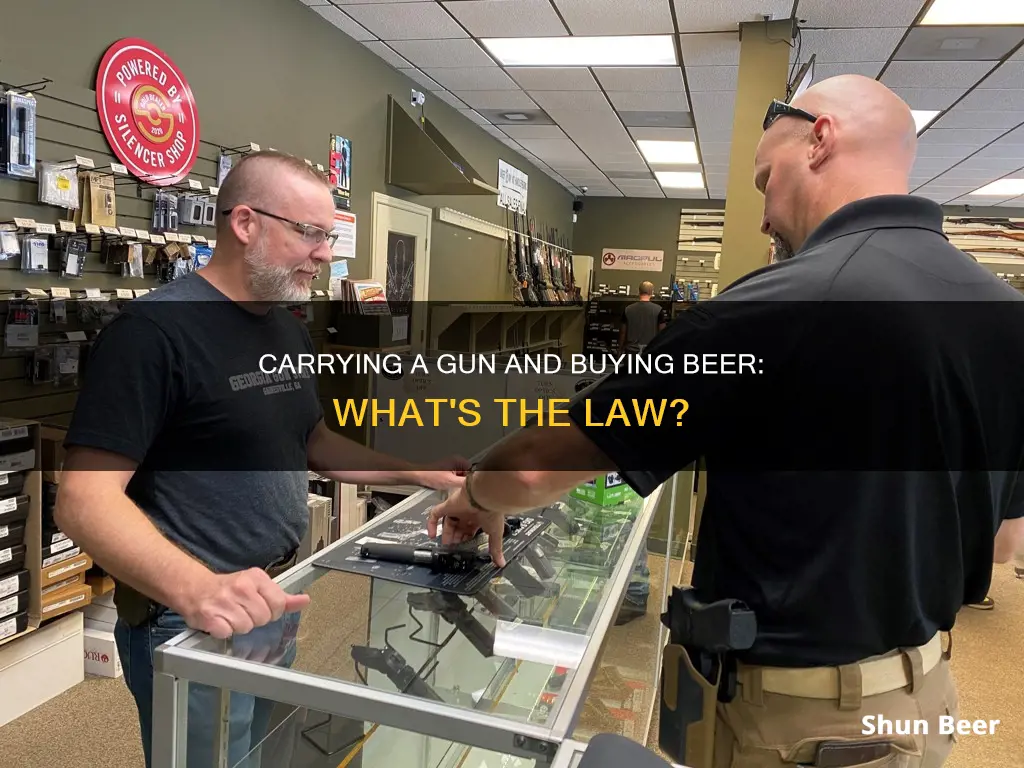
In the United States, the laws regarding the purchase of alcohol while carrying a gun vary from state to state. While some states do not address this issue in their statutes, others impose a complete ban on any alcohol consumption while carrying a firearm. Still, other states prohibit carrying a gun only when a person is intoxicated or under the influence, with varying definitions of what constitutes intoxication or impairment. In Texas, for example, it is illegal to carry a firearm while intoxicated, with a blood alcohol concentration of 0.08 or higher. Additionally, Texas law prohibits carrying a firearm into bars and certain restaurants and cafes that derive more than 51% of their revenue from alcohol sales. While opinions differ among gun owners about the legality and wisdom of drinking while carrying a gun, the general consensus is that it is unwise to mix the two, as alcohol can impair judgment, slow reaction times, and increase the risk of accidents.
What You'll Learn

Drinking and carrying a gun is considered dumb by some
In addition to the safety concerns, there are legal implications to consider. In some states, it is illegal to carry a firearm while drinking or to even have a gun in a bar or restaurant that serves alcohol. Texas, for example, has strict laws prohibiting carrying a firearm while intoxicated and banning guns in establishments that receive more than 51% of their revenue from alcohol sales. Violating these laws can result in significant fines and jail time. Even in states without specific laws banning drinking and carrying, gun owners can still face legal consequences if they need to use their weapon after consuming alcohol. Prosecutors may use the presence of alcohol in the system to build a case, and civil suits from victims or their families could also arise.
While the laws and opinions vary, it is essential to prioritise safety and make responsible choices. As a gun owner, it is crucial to be aware of and comply with the relevant laws and regulations in your state. Additionally, it is worth considering the potential risks and consequences of mixing alcohol and firearms. By staying informed and making sensible decisions, gun owners can help ensure their safety and the safety of those around them.
Ultimately, drinking and carrying a gun is a matter of personal responsibility and judgement. While some may argue that having a drink or two while carrying is acceptable, it is essential to recognise the potential risks and legal implications. By staying informed and making sensible choices, gun owners can help ensure their safety and compliance with the law.
Non-Alcoholic Beer: Underage Access and Legal Complications
You may want to see also

Carrying a gun while drinking could lead to legal repercussions
Carrying a firearm while drinking could lead to legal repercussions, and it is important to understand the relevant laws and regulations. The legal implications of drinking and carrying a gun vary across different states in the US. Some states prohibit any consumption of alcohol while carrying a firearm, while others ban carrying only when an individual is intoxicated or under the influence. Texas, for example, has specific laws prohibiting carrying a firearm into bars, and establishments that derive more than 51% of their revenue from alcohol sales.
Regardless of state laws, it is generally advised that individuals do not carry a firearm while drinking. Alcohol can impair judgment, slow reaction times, and impact decision-making abilities. Even a small amount of alcohol can affect an individual's perceptions, inhibitions, reaction times, and fine motor coordination. Therefore, drinking and carrying a firearm can increase the risk of accidents, such as negligently discharging a weapon or leaving it in an unsafe area.
The legal repercussions of carrying a firearm while drinking can be severe. If an individual is caught carrying a firearm while intoxicated, they may face criminal charges, significant fines, and even jail time. Additionally, if an individual needs to use their firearm in self-defense while under the influence, they may still face legal consequences. Prosecutors may use the presence of alcohol in the individual's system to build a case against them, and they could be arrested, charged, and even face civil lawsuits.
To avoid legal repercussions and ensure safety, it is recommended to keep firearms safely stored and out of possession when drinking. The specific regulations and laws regarding drinking and carrying firearms vary by state, so individuals should be aware of the relevant laws in their area. Understanding and complying with these laws are part of the responsibility of gun ownership.
Best Online Stores for Beer Mug Shoppers
You may want to see also

Some US states have laws prohibiting carrying a gun in bars
In the US, the relationship between alcohol and guns is a contentious issue. While some states have laws prohibiting carrying a gun in bars, others allow it, provided the individual has a permit. Tennessee, Arizona, Georgia, and Virginia are among the states that have recently enacted laws explicitly permitting loaded guns in bars. This development has sparked a debate between gun rights advocates, who support the new laws, and those who believe that mixing guns and alcohol poses a safety risk.
The presence of guns in bars and restaurants that serve alcohol has raised concerns among customers, waitstaff, and business owners. Proponents of gun rights argue that carrying a firearm is a matter of personal protection. However, others worry that introducing guns into social settings where alcohol is consumed can increase the likelihood of violent incidents and impair judgement. This concern is supported by research, which indicates that nearly half of all people convicted of homicide report being under the influence of alcohol at the time of their crime.
While some states have embraced a more permissive approach to guns in bars, others maintain restrictions. California, Florida, Hawaii, Illinois, Kentucky, Louisiana, Maryland, New Jersey, New Mexico, North Dakota, Oklahoma, Texas, Washington, and New York are among the states that have adopted policies prohibiting the concealed carry of guns in bars. These laws reflect an effort to mitigate the potential risks associated with mixing guns and alcohol.
The legal landscape surrounding guns in bars varies across the US, with some states prioritising gun rights while others focus on regulating the presence of firearms in establishments serving alcohol. This discrepancy in state laws highlights the ongoing debate over the appropriate balance between Second Amendment rights and public safety concerns.
Despite the differing approaches, a common theme emerges: the recognition that alcohol and guns can be a volatile combination. Even in states that allow guns in bars, there is a general consensus that drinking to excess while carrying a firearm is unwise and irresponsible. Responsible gun owners understand the importance of maintaining control over their actions and avoiding situations that could lead to impaired judgement or increased aggression.
Best Places to Buy Sprecher Root Beer
You may want to see also

The definition of intoxication varies from state to state
The definition of intoxication and the laws surrounding it vary from state to state in the US. Intoxication is defined as a state in which a person's capacity to act or reason is inhibited by alcohol or drugs. The legal standard of intoxication, in the context of drunk driving, differs across states, with blood alcohol content limits ranging from 0.08 to 0.10.
In some states, such as California, a distinction is made between voluntary and involuntary intoxication, with only the latter being accepted as a defence in criminal cases. Involuntary intoxication occurs when an individual unknowingly ingests an intoxicating substance due to force or fraud. In such cases, the defendant can argue that they did not understand the wrongfulness of their actions due to their compromised mental state.
Voluntary intoxication, on the other hand, refers to the willing ingestion of alcohol or drugs, and many states have eliminated this as a valid defence. For instance, Delaware does not permit any evidence of voluntary intoxication to be presented in court. Other states, like California, only allow defendants to raise voluntary intoxication as a defence in specific-intent crimes, where the defendant's actions lacked the necessary criminal intent.
The definition of intoxication also differs when it comes to public drunkenness. Here, the standard is more subjective, and an intoxicated person is deemed to be a danger to themselves or others, unable to care for themselves, causing a disturbance, or refusing to leave a public space when asked to do so.
The varying definitions and laws surrounding intoxication highlight the importance of understanding the specific regulations in each state. While some states may have more lenient definitions, others take a stricter approach, and it is essential to be aware of these differences to ensure compliance with the law.
Fort Wilderness Beer Buying Guide for Campers
You may want to see also

Some establishments are off-limits to those carrying a gun
The laws regarding carrying a gun in public places, including bars and liquor stores, vary from state to state in the US. While some states have stricter laws prohibiting guns in bars and liquor stores, others have more relaxed regulations.
Some states, such as Ohio, have laws that make it illegal to carry a gun while drinking. Other states, like Oregon, prohibit carrying a gun in a bar but do not have specific restrictions on drinking and carrying. In some states, such as Arizona, carrying a gun in a bar or liquor store is generally allowed, as long as the individual is not consuming alcohol.
It is important to note that even within states, local laws and regulations may vary, and it is always advisable to check the specific laws applicable to your area. Additionally, federal law prohibits carrying firearms in certain places, such as federal courthouses, national cemeteries, and post offices.
While the laws regarding carrying a gun in bars and liquor stores vary, it is important to prioritize safety and make informed decisions about carrying a gun while drinking. As discussed in an online forum, some individuals choose to avoid carrying a gun while going to bars or drinking, as they believe it is a safety risk. Others may choose to limit their alcohol consumption when carrying a gun. Ultimately, it is crucial to follow the laws and regulations specific to your state and local area to ensure compliance and safety.
Magic Kingdom's Best Beer Buying Spots
You may want to see also
Frequently asked questions
This depends on where you are. In Texas, for example, it is illegal to carry a firearm into a bar or a restaurant/cafe that makes more than 51% of its revenue from alcohol sales. Other states have different laws, with some banning any consumption of alcohol while carrying a gun, and others not addressing the issue at all.
While your drinking tolerance may vary, you are considered intoxicated when you have a specific concentration of alcohol in your blood (generally .08), and are no longer permitted to carry a gun until you are sober.
Drinking while carrying a gun increases the risk of accidents, such as dropping or negligently discharging your gun, or leaving it in an unsafe area. If you have to use your gun in self-defence, you are also more likely to face legal consequences, as prosecutors can use the fact that you had alcohol in your system against you.







